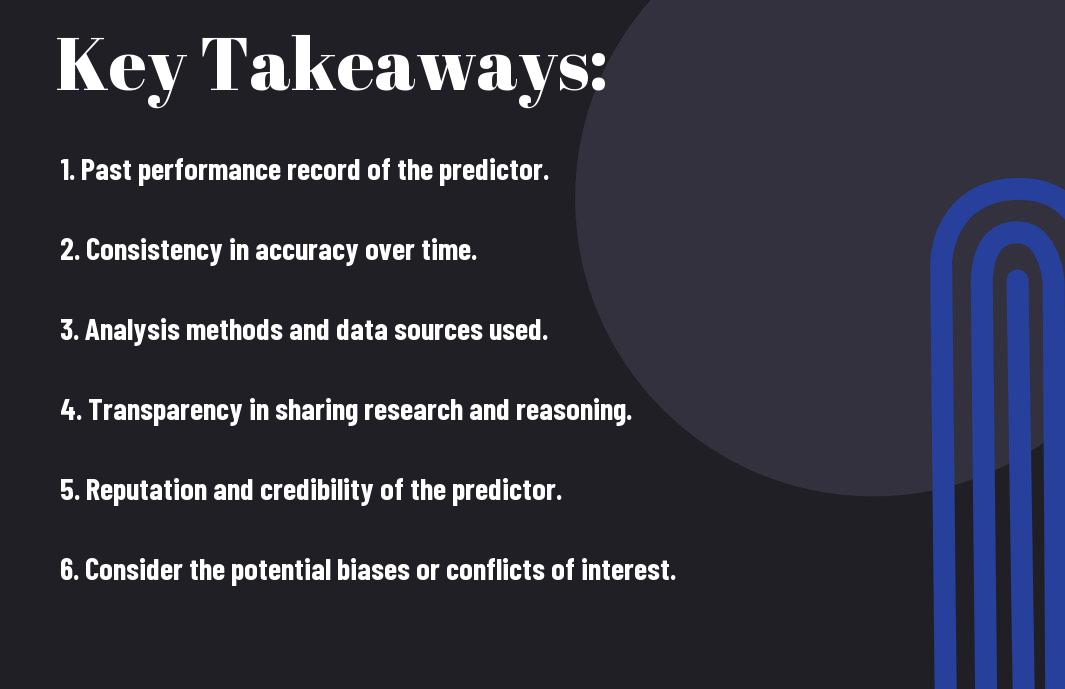You know that feeling of anticipation and excitement when you’re about to place a bet on a sports game? Before you make your decision, consider the myriad of factors that come into play when assessing the reliability of sports picks and predictions. Understanding the intricacies can significantly enhance your chances of success. Have you ever wondered how sportsbooks are so accurate at predicting odds? If so, check out this thread on ELI5: How are sportsbooks so accurate predicting odds … for insights. Let’s probe into the necessary elements that contribute to the reliability of sports picks and forecasts.

Key Takeaways:
- Track Record: Consider the track record of the sports handicapper or website making the picks and predictions.
- Transparency: Look for transparency in the methodology used to make the picks, including past performance accuracy.
- Consistency: Evaluate the consistency of the picks and predictions over a period of time, rather than focusing on short-term results.


The Importance of Critical Thinking
For a sports bettor, the ability to think critically is crucial when evaluating the reliability of sports picks and predictions. Critical thinking involves analyzing information objectively, without letting personal biases influence your decision-making process. By honing your critical thinking skills, you can make more informed and rational choices when it comes to selecting sports picks.
Avoiding Confirmation Bias
With so much information available on sports picks and predictions, it’s easy to fall into the trap of confirmation bias. This cognitive bias occurs when you seek out information that confirms your existing beliefs or hypotheses while ignoring any contradictory evidence. To combat confirmation bias, make a conscious effort to consider all sides of an argument and weigh the evidence objectively before making a decision.
The Dangers of Emotional Decision-Making
Bias in decision-making can also stem from emotions clouding your judgment. As far as sports picks and predictions, it’s imperative to separate your emotions from your choices. Emotions like excitement, fear, or disappointment can lead you to make impulsive decisions that are not based on logic or reasoning. By learning to regulate your emotions and making decisions based on facts rather than feelings, you can improve the reliability of your sports picks.
Evaluating the Source of Sports Picks
Assuming you are looking for reliable sports picks and predictions, evaluating the source of these recommendations is crucial. One way to ensure the credibility of the source is by checking if the expert providing the picks has the necessary expertise and credentials. You can learn more about how to make accurate predictions based on the analysis of sports events in this insightful article How to make accurate predictions based on the analysis of sports events.
Expertise and Credentials
The expertise and credentials of the individual or group offering sports picks can give you a good indication of their ability to provide accurate predictions. A solid background in sports analysis, statistics, or experience in the specific sport can enhance the credibility of the source.
Track Record and Consistency
To gauge the reliability of a source providing sports picks, you should assess their track record and consistency in making accurate predictions over time. A proven track record of successful picks, especially over a range of different sports events, can give you confidence in the source’s abilities.
Track records of sports experts can speak volumes about their predictive capabilities. Consistency in delivering accurate picks is imperative and can showcase the reliability of the source. It’s imperative to look for consistent success rather than occasional lucky guesses to ensure you are getting quality sports predictions.
Transparency and Accountability
Any reputable source of sports picks should operate with transparency and accountability. This means they should be willing to disclose their methods of analysis, sources of information, and provide explanations for their picks. Transparency builds trust and credibility in the predictions offered.
Credentials can also play a significant role in evaluating the reliability of sports picks. If the source has relevant qualifications, experience, or affiliations in the sports industry, it can add to their credibility in providing accurate predictions. Reviewing the credentials of the individuals or group behind the sports picks can help you make informed decisions when choosing which predictions to follow.
Analyzing Statistical Data
Sample Size and Representativeness
Statistical analysis plays a crucial role in evaluating the reliability of sports picks and predictions. All statistical data must be scrutinized for its sample size and representativeness. A small sample size can lead to unreliable conclusions, as it may not accurately reflect the broader population. Ensure that the data used in sports predictions comes from a diverse and representative sample to increase the validity of the analysis.
Correlation vs. Causation
On the topic of statistical analysis, it’s necessary to distinguish between correlation and causation when evaluating sports picks and predictions. Correlation simply means that two variables are related in some way, but it does not imply that one variable causes the other. Understanding this distinction is critical in interpreting statistical data accurately and drawing meaningful conclusions.
Correlation does not prove causation. Just because two variables are correlated does not mean that one causes the other. It’s important to explore deeper into the data and consider other factors before attributing causation to a relationship between variables.
Contextualizing Numbers
Representativeness is key when analyzing statistical data for sports picks and predictions. All numbers presented must be contextualized within the specific sport, league, or team they relate to. By considering the broader context of the data, you can better understand its implications and make more informed decisions when using it to inform sports predictions.
On top of evaluating the statistical numbers, taking the time to understand the context in which they exist can provide valuable insights into the reliability of sports picks and predictions. By placing numbers within their appropriate context, you can grasp the full picture and make more accurate assessments.
Considering External Factors
Despite the comprehensive analysis and statistical models used to make sports predictions, external factors can significantly impact the outcomes of games. When evaluating the reliability of sports picks and predictions, it’s important to consider various external variables that could influence the result. Any oversight of these external factors could lead to inaccurate predictions and potential losses in sports betting.
Injuries and Player Availability
On any given game day, injuries and player availability can dramatically alter the performance and dynamics of a team. A star player’s absence or a key player being sidelined due to an injury can shift the balance of power between competing teams. It is crucial to stay updated on player injury reports and assess how these absences might affect the team’s strategy and overall performance.
Weather and Environmental Conditions
Injuries are not the only external factors that can impact a game’s outcome. Weather and environmental conditions, such as extreme heat, cold, wind, or rain, can also play a significant role in determining the success of a team. Adverse weather conditions can affect players’ abilities to perform at their best, leading to unexpected results on the field.
Players must adapt their gameplay based on the weather conditions, which may favor one team over the other. Additionally, certain teams may have a better track record of performing well in adverse weather, giving them an advantage in such situations.
Coaching and Team Dynamics
Environmental influences, such as coaching strategies and team dynamics, can be crucial in predicting the outcome of a game. The coaching style, leadership skills, and team cohesion all contribute to how well a team performs on the field. A sudden change in coaching staff or internal team conflicts can disrupt the synergy within a team, impacting their gameplay and overall success.
Understanding how coaching decisions and team dynamics can influence player performance is important when evaluating sports picks and predictions. Strong leadership and positive team dynamics often translate into better on-field results, while internal discord can lead to unexpected outcomes. Paying attention to these external factors can give you valuable insights into the reliability of sports predictions and help you make more informed betting decisions.
Identifying Red Flags
After understanding the key factors in evaluating sports picks and predictions, it’s crucial to be aware of potential red flags that could indicate unreliability. These red flags can help you filter out unreliable sources and make more informed decisions when considering sports predictions.
Unrealistic Claims and Guarantees
Unrealistic claims and guarantees of success are common red flags to watch out for when evaluating sports picks. If a service promises an unreasonably high success rate or guarantees wins, proceed with caution. No sports handicapper can guarantee outcomes with certainty due to the unpredictable nature of sports.
Lack of Transparency and Accountability
Accountability is vital when it comes to sports predictions. A lack of transparency regarding how picks are made, the methodology used, or a refusal to provide past performance records are all warning signs. Reliable sports prediction services should be open about their processes and track record to build trust with their audience.
With transparency comes accountability. Reputable sports prediction services should not shy away from being held accountable for their picks. They should be willing to explain their reasoning behind predictions and have a system in place to track and analyze their performance over time.
Unsubstantiated Claims and Biases
One common red flag to look out for is unsubstantiated claims and biases in sports predictions. If a service consistently favors a specific team or player without valid reasoning or data to back it up, this could indicate a lack of objectivity. It’s vital to be wary of biases that may skew predictions and lead to unreliable outcomes.
This leads us to the importance of remaining objective in evaluating sports picks. Look for services that provide a balanced analysis based on data, statistics, and trends rather than personal biases or subjective opinions. By considering these red flags and remaining objective in your assessment, you can improve your ability to identify reliable sports picks and predictions.
Developing a Balanced Perspective
Weighing Different Opinions and Sources
To make well-informed decisions about sports picks and predictions, it’s crucial to consider a variety of opinions and sources. Any seasoned sports bettor will tell you that relying on just one expert or website may not always yield the best results. By seeking out diverse viewpoints and analyzing information from multiple sources, you can gain a more comprehensive understanding of the factors at play in a particular game or match.
Considering Alternative Scenarios
To minimize the risk of relying too heavily on a single prediction, it’s important to consider alternative scenarios when evaluating sports picks. It’s easy to fall into the trap of confirmation bias, where you only seek out information that supports your initial prediction. It’s vital to actively challenge your assumptions and explore different possible outcomes to ensure you’re making a well-rounded assessment of the situation.
It’s wise to remember that in sports, unexpected events can and do happen. By mentally preparing for various outcomes, you can approach your decision-making process with more flexibility and adaptability, ultimately increasing your chances of making sound predictions.
Avoiding Overconfidence
For all the excitement that comes with sports betting, it’s crucial to guard against overconfidence in your predictions. While it’s empowering to have a good grasp of the game and its nuances, remember that sports are inherently unpredictable. For instance, an upset victory or a key player getting injured can swiftly change the course of a match. By maintaining a healthy level of skepticism and humility, you can avoid the pitfalls of overconfidence that may lead to hasty decisions and potential losses.
Understanding that sports picks and predictions are inherently uncertain can help you approach them with a more balanced and rational mindset. By acknowledging the limitations of your knowledge and embracing a continuous learning attitude, you can navigate the complexities of sports betting with prudence and resilience.
Conclusion
So, when evaluating the reliability of sports picks and predictions, remember to consider factors such as the track record of the source, the level of expertise and analysis provided, the transparency and accountability of the predictions, and the use of reliable data and statistics. By keeping these factors in mind, you can make informed decisions when it comes to choosing which sports picks and predictions to trust.
Ultimately, your goal should be to find sources that have a proven track record of accuracy, provide detailed analysis and insights, and are transparent about their methods and results. By taking the time to assess these factors, you can increase your chances of making successful bets and enjoying a more rewarding sports betting experience. Good luck!
Q: What factors should be considered when evaluating the reliability of sports picks and predictions?
A: When evaluating the reliability of sports picks and predictions, there are several key factors to consider:
Q: How important is the track record of the predictor?
A: The track record of the predictor is crucial in assessing reliability. Look for predictors with a proven history of successful predictions and a transparent record of their past picks.
Q: What role does statistical analysis play in determining the reliability of sports picks?
A: Statistical analysis is necessary in evaluating the reliability of sports picks. Factors like historical data, player performance, team statistics, and trends can all be valuable in making informed predictions.



